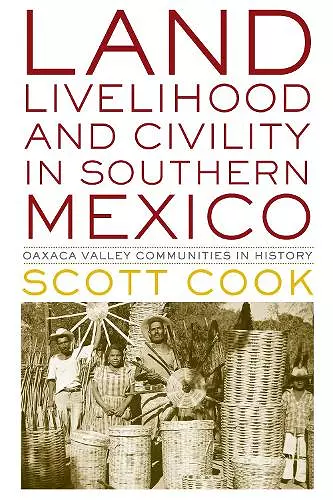Land, Livelihood, and Civility in Southern Mexico
Oaxaca Valley Communities in History
Format:Hardback
Publisher:University of Texas Press
Published:15th May '14
Currently unavailable, and unfortunately no date known when it will be back

"In Scott Cook's examination of social relations, land ownership, and artisan trades in rural Oaxaca, the anthropologist reveals not only his profound knowledge of village life but also a clear understanding of the historical perspective in which it has existed over time. The present work bears the hallmark of long experience in the field and much thought concerning the lives of the people about whom he writes." -- Brian Hamnett, Research Professor in History, University of Essex "A very good read. It transported me right back to Oaxaca. I think its greatest strength lies in the wealth of detail Cook provides on land struggles and commodity production and marketing-the two main topics. A third topic, the civil-religious hierarchy is also covered well and with fascinating detail. I didn't look at the photos until finishing the chapters, and when I did, I found that they validated images in my mind's eye that the text had already conjured up-a tribute to the vividness of Cook's descriptions. I think he has handled the historical materials quite well. He approaches them carefully and thoughtfully, and his interpretations are appropriate and consistent with his data... He deals effectively with both temporal continuity and change... I felt as if I understood Oaxaca much better after reading the book... It adds considerably to our ethnographic and historical knowledge of the Valley, and it does it in a very humane and interesting way." -- John Chance, Emeritus Professor of Cultural Anthropology and Ethnohistory, Arizona State University "Scott Cook connects his anthropological research on peasant commodity production in Oaxaca, Mexico, back to the post-colonial historical record for the same communities. He is able to show that the apparent continuity of small-scale rural activities over time is, in reality, shot through with change brought about by peasant endeavor, in the context of population growth and shifting access to land and markets over the last century and a half. A key feature of the book is the use made of oral history, based on interviews held between 1965 and 1990, to link to the Oaxacan archival materials." -- Colin Clarke, Emeritus Professor of Geography, Oxford University "This book is a masterpiece of storytelling and historical narrative... It should be profoundly influential and will become a must [read] source for anyone interested in the Valley of Oaxaca, its history, and its peoples. It will also appeal to general readers of Latin American history and anyone interested in peasant land struggles regardless of where they are found." -- Joseph W. Whitecotton, Professor Emeritus of Anthropology, University of Oklahoma, and author of The Zapotecs: Princes, Priests, and Peasants
Based on thirty-five years of fieldwork, this is a masterful ethnographic historical account of the struggle to maintain landholding, livelihood, and civil-religious society in the peasant-artisan communities of Oaxaca from colonial times to the present.
In the Valley of Oaxaca in Mexico’s Southern Highland region, three facets of sociocultural life have been interconnected and interactive from colonial times to the present: first, community land as a space to live and work; second, a civil-religious system managed by reciprocity and market activity wherein obligations of citizenship, office, and festive sponsorships are met by expenditures of labor-time and money; and third, livelihood. In this book, noted Oaxacan scholar Scott Cook draws on thirty-five years of fieldwork (1965–1990) in the region to present a masterful ethnographic historical account of how nine communities in the Oaxaca Valley have striven to maintain land, livelihood, and civility in the face of transformational and cumulative change across five centuries.
Drawing on an extensive database that he accumulated through participant observation, household surveys, interviews, case studies, and archival work in more than twenty Oaxacan communities, Cook documents and explains how peasant-artisan villagers in the Oaxaca Valley have endeavored over centuries to secure and/or defend land, worked and negotiated to subsist and earn a living, and striven to meet expectations and obligations of local citizenship. His findings identify elements and processes that operate across communities or distinguish some from others. They also underscore the fact that landholding is crucial for the sociocultural life of the valley. Without land for agriculture and resource extraction, occupational options are restricted, livelihood is precarious and contingent, and civility is jeopardized.
Provides one of the most thorough accounts of Central Oaxaca’s modern political and economic system. Cook skillfully weaves together archaeological, historical, and his own ethnographic data. . . . Although it will be required reading for any scholar of Oaxaca, Cook’s comprehensive work is an invaluable contribution to the study of the social relations embedded in Mexican and Latin American rural economies. * Journal of Anthropological Research *
This volume is a testimony to the lasting influences of social practices that anchor households to a territory that is historically and culturally constituted as a single entity, even when repeatedly crisscrossed by migration flows, contested national policies, and neoliberal reforms. . . . This book will be an illuminating experience for advanced undergraduate and professional readers interested in peasant survival strategies, agrarian struggles, and the social and economic anthropology of Meixco and Latin America. * American Anthropologist *
ISBN: 9780292754768
Dimensions: unknown
Weight: 454g
403 pages